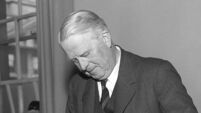Author interview: Jordan’s engaging life story challenges idea of memory

Neil Jordan speaking about his new book titled ‘Amnesiac’ at the Seafront venue as part of the Dalkey Book Festival. ‘I understand more things that I’ve done myself and I understand certain obsessions that have remained with me. Picture: Conor McCabe
- Amnesiac: A Memoir
- Neil Jordan
- Head of Zeus, €19.99/ Kindle, €7.05
BOOKS & MORE
Check out our Books Hub where you will find the latest news, reviews, features, opinions and analysis on all things books from the Irish Examiner's team of specialist writers, columnists and contributors.







